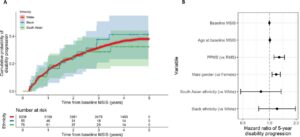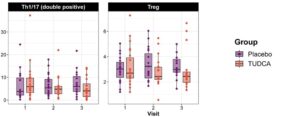August 30th
This study describes a new mouse model for studying MS, in which oligodendrocytes lose proteins critical for transporting myelin components, leading to demyelination.
Bryostatin-1 downregulates inflammatory microglial states
In this study, the protein kinase C modulator bryostatin-1 significantly shifted microglia away from inflammatory profiles, expanding on previous work establishing this in peripheral immune cells.
Lipid metabolism and immune responses under common control
This study found that the transcription factor Irf5 is required for clearance of myelin debris by microglia in demyelination models.
Greater cortical lesion size, greater neurotransmitter imbalance?
In this study, larger cortical lesions in patients with MS were correlated with greater levels of excitatory/inhibitory imbalance, with glutamate levels rising as GABA levels fall.
August 7th
Patient-derived glia are intrinsically inflammatory
Using iPSC lines derived from patients with all 3 subtypes of MS, this study found that patient astrocytes are predisposed to take on pathological phenotypes.
MS model shows changes in astrocyte calcium signaling
This study found that in a mouse model of MS, astrocytes show significant alterations in calcium signaling.
Additional July preprints
Differences in brain network flexibility across MS subtypes
This EEG study found that patients with RRMS, but not SPMS, show a wider repertoire of functional connectivity patterns than controls, with increased variety correlating with higher EDSS scores.
Large-scale analysis of the MS serum proteome
Leveraging proteomic data recently released by UK Biobank, this study compared serum protein levels in 380 patients with MS and over 38,000 controls.




